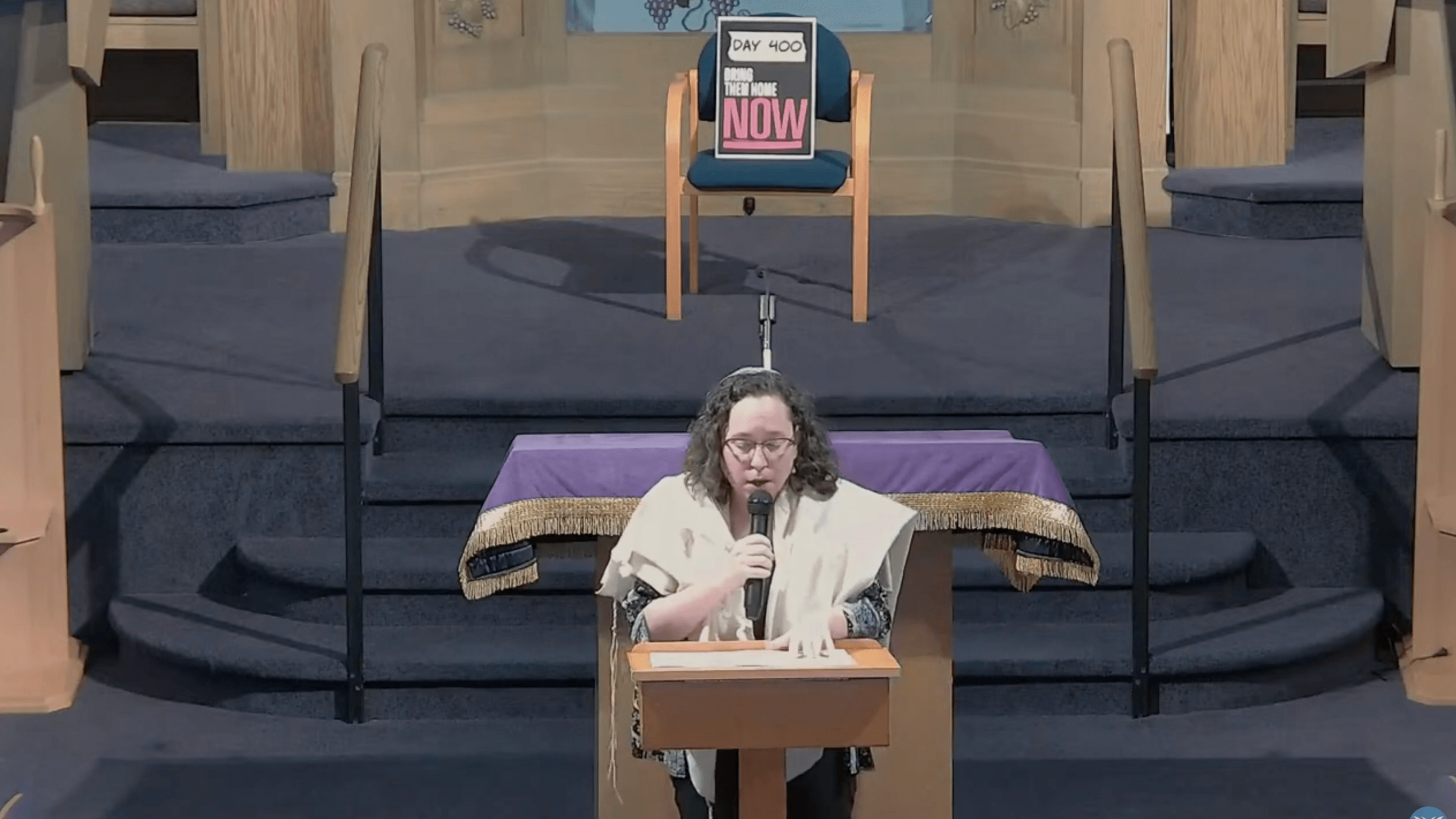Like our patriarch Abraham, American Jews face 10 post-election tests of our values
We must respect different opinions, remember we were slaves in Egypt and lead by example

A screenshot of Rabbi Julie Roth’s post-election sermon at Congregation Shomrei Emunah Courtesy of Congregation Shomrei Emunah
This essay is adapted from the sermon the author gave on the Shabbat after the presidential election at her synagogue, Shomrei Emunah in Montclair, New Jersey.
The first Torah portion Jews read after the election that will return President Donald Trump to the White House was Lech Lecha, where our forefather Abraham embarked on a journey to a destination then unknown. Along the way, he faced 10 trials that helped define the values that have guided the Jewish people ever since.
Like Abraham, we now face a journey to an unknown destination. I see 10 trials ahead for us, as Americans and as Jews.
1. The ‘Place that I will show you’ test
This quote from Lech Lecha is about the challenge of living with an uncertain future. Regardless of who we voted for, we must acknowledge and support those in our communities who are disappointed by the result and feeling dread about what is to come. Can we work with people we disagree with to shape the future we want in our synagogues, schools and neighborhoods?
2. The ‘Elu v’elu’ test
This is based on a famous passage from the Talmud, where opposing opinions — these and these, elu v’elu — are declared to be legitimate. It’s a central value in Judaism: that we can disagree without villainizing each other. In an electorate divided almost exactly in half, how can we better understand the points of view of those who voted differently?
3. The Niemoller Test
Martin Neimoller was a German Lutheran pastor who opposed the Nazis. He is the author of the famous poem that opens “First they came for the socialists and I did not speak out because I am not a socialist” and closes with: “Then they came for me, and there was no one left to speak out for me.”
If President-elect Trump’s rhetoric becomes reality, and he unjustly comes after people who are innocent — people other than Jews — we must speak out.
4. The LGBTQ+ Ally test
Our tradition teaches that every human being is created b’tzelem elohim, in the image of God. That includes LGBTQ+ people, and Jews must stand up to protect their rights and those of other marginalized people wherever they are threatened.
5. The “Because we were strangers” test
It is repeated 36 times in the Torah that we should treat the stranger with compassion because we ourselves were strangers in the land of Egypt — in Hebrew, ki gerim hayitem.
This test demands that we watch out for those most vulnerable in our society, not from a place of fear about what might happen to us, but from a place of empathy based on our historical experience. This test applies even as we, too, feel more vulnerable in a time of increasing antisemitism.
6. The ‘There shall be no needy’ test
This comes from the Book of Deuteronomy, and the passage goes on to say that if there are needy among you, “do not harden your heart and shut your hand against your needy kin, rather you shall open your hand and lend whatever is sufficient for the need.”
The election results made clear that millions of Americans are struggling economically in a time of inflation. We must resolve to help those in our own communities facing food and housing insecurity.
7. The Hagar and Ishmael test
This one is inspired by the medieval rabbi Maimonides’ version of the 10 tests of Abraham. Living under Muslim rule in Cordoba, Maimonides was not only immersed in Arab culture and thought but also inspired by it. His list included the test of Abraham being told by God to send his wife Hagar and son Ishmael into the wilderness.
We are living in a precarious time, with Israel still at war more than 400 days after the Oct. 7 terror attacks. Whether one administration or the other is better for Israel is a matter of debate, but if the United States gives Prime Minister Benjamin Netanyahu and his extremist coalition unfettered support, the impact on Palestinian civilians could be devastating.
The Hagar and Ishmael test asks us to have compassion for Palestinian women and children even in a time of war.
8. The truth test
There’s a famous saying, often attributed to the Nazi propagandist Joseph Goebbels, that if you tell a lie big enough and keep repeating it, people will eventually come to believe it. We are living in a time when it is exhausting to debunk every lie in politics, especially in the echo chambers of social media. But when lies dehumanize our neighbors, we must speak up.
The word emet — truth — is a key attribute of God mentioned throughout our liturgy, an attribute we are asked to live up to in our personal and our political lives.
9.The lead-by-example test
From Moses through the Talmud to today, there is an idea in Judaism that our leaders should exemplify the highest qualities we aspire to as human beings — in their public lives, but also in their personal lives. The test for us is to choose which examples to follow and to be our own examples of what is good and just.
10.The raise your voice test
When Abraham saw that God was going to destroy Sodom and Gomorrah, he challenged God in hopes of sparing their citizens. It was in this moment that Abraham became our first prophet. We have elected officials at all levels of government who need to hear our voices when we disagree with their policies and actions.
These 10 tests are certainly not the only ones, or the only way of thinking about them. We will be tested individually and collectively, as Jews and as Americans, in the coming months and years.
May we be spared from the worst trials we fear. And may we have the fortitude to pass the tests we face.















